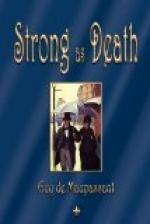The dews of evening impregnated the park with freshness, the soft breeze made the trees tremble, and the earth exhaled imperceptible vapors which threw a light, transparent veil over the horizon. The three cows, standing with drooping heads, cropped the grass with avidity, and four peacocks, with a loud rustling of wings, flew up into their accustomed perch in a cedar-tree under the windows of the castle. The barking of dogs in the distance came to the ear, and in the quiet air of the close of day the calls of human voices were heard, in phrases shouted across the fields, from one meadow to another, and in those short, guttural cries used in driving animals.
The painter, with bared head and shining eyes, breathed deeply, and, as he met the Countess’s look, he said:
“This is happiness!”
“It never lasts,” she answered, approaching nearer.
“Let us take it when it comes,” said he.
“You never used to like the country until now,” the Countess replied, smiling.
“I like it to-day because I find you here. I do not know how to live any more where you are not. When one is young, he may be in love though far away, through letters, thoughts, or dreams, perhaps because he feels that life is all before him, perhaps too because passion is stronger than pure affection; at my age, on the contrary, love has become like the habit of an invalid; it is a binding up of the soul, which flies now with only one wing, and mounts less frequently into the ideal. The heart knows no more ecstasy, only selfish wants. And then I know quite well that I have no time to lose to enjoy what remains for me.”
“Oh, old!” she remonstrated, taking his hand tenderly.
“Yes, yes, I am old,” he repeated. “Everything shows it, my hair, my changing character, the coming sadness. Alas! that is something I never have known till now—sadness. If someone had told me when I was thirty that a time would come when I should be sad without cause, uneasy, discontented with everything, I should not have believed it. That proves that my heart also has grown old.”
The Countess replied with an air of profound certainty:
“Oh, as for me, my heart is still young. It never has changed. Yes, it has grown younger, perhaps. Once it was twenty; now it is only sixteen!”
They remained a long while thus, talking in the open window, mingled with the spirit of evening, very near each other, nearer than they ever had been, in this hour of tenderness, this twilight of love, like that of the day.
A servant entered, announcing:
“Madame la Comtesse is served.”
“Have you called my daughter?” the Countess asked.
“Mademoiselle is in the dining-room.”
All three sat down at the table. The shutters were closed, and two large candelabra with six candles each illumined Annette’s face and seemed to powder her hair with gold dust. Bertin, smiling, looked at her continually.




